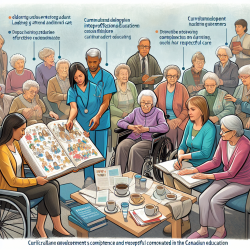Introduction
The burgeoning population of older adults presents a significant challenge for healthcare and social services. As professionals in these fields, it is imperative to prepare for this demographic shift by enhancing gerontological content in educational programs. The research article "Gerontological Content in Canadian Nursing and Social Work Programs" provides insights into how educational institutions are responding to this need.
Key Findings from the Research
The study surveyed English-speaking nursing and social work programs across Canada, using competencies developed by the National Initiative for the Care of the Elderly (NICE) as a framework. Key findings include:
- There is an increasing incorporation of gerontological content in curricula, with 42% of faculties reporting changes since 2004.
- Despite this progress, only a small percentage of faculty specialize in gerontology, and few students choose gerontological settings for their final practicum.
- The integration of gerontological content is often within an integrated curriculum rather than stand-alone courses, which may dilute the focus on gerontology.
Improving Educational Outcomes
To improve outcomes, the study suggests several strategies:
- Recruitment of Faculty: Increase recruitment of faculty with gerontological expertise to ensure comprehensive coverage of the subject.
- Curriculum Structure: Consider a mixed approach that includes both integrated and stand-alone courses to provide concentrated learning experiences.
- Tracking and Monitoring: Use NICE competencies to track and monitor gerontological content, ensuring that it meets educational standards and student needs.
- Interdisciplinary Learning: Enhance interdisciplinary learning opportunities to prepare students for collaborative geriatric care.
- International Models: Incorporate learning from international models of care to broaden students' perspectives and improve program effectiveness.
Encouraging Further Research
While the study provides valuable insights, it also highlights areas needing further research, such as the complex relationship between attitudes, knowledge, and interest in gerontological practice. Exploring these areas can lead to more effective educational strategies and better preparation of students for working with older adults.
Conclusion
The findings underscore the need for continuous improvement in gerontological education. By implementing the study's recommendations, educational institutions can better prepare future professionals to meet the needs of an aging population. For practitioners, this means engaging with ongoing research and advocating for enhanced gerontological content in curricula.
To read the original research paper, please follow this link: Gerontological Content in Canadian Nursing and Social Work Programs.










